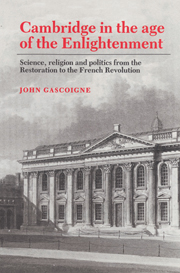 Cambridge in the Age of the Enlightenment
Cambridge in the Age of the Enlightenment Book contents
- Frontmatter
- Contents
- Acknowledgements
- Abbreviations
- Note
- Introduction
- PART ONE THE ‘HOLY ALLIANCE’ IN GESTATION, 1660–88
- PART TWO THE ‘HOLY ALLIANCE’ PROCLAIMED, 1689–1768
- PART THREE THE ‘HOLY ALLIANCE’ QUESTIONED, 1769–1800
- 7 The eclipse of whig Cambridge
- 8 The revival of revealed theology
- 9 Mathematics ascendant
- Epilogue
- Bibliography
- Index
8 - The revival of revealed theology
Published online by Cambridge University Press: 24 August 2009
- Frontmatter
- Contents
- Acknowledgements
- Abbreviations
- Note
- Introduction
- PART ONE THE ‘HOLY ALLIANCE’ IN GESTATION, 1660–88
- PART TWO THE ‘HOLY ALLIANCE’ PROCLAIMED, 1689–1768
- PART THREE THE ‘HOLY ALLIANCE’ QUESTIONED, 1769–1800
- 7 The eclipse of whig Cambridge
- 8 The revival of revealed theology
- 9 Mathematics ascendant
- Epilogue
- Bibliography
- Index
Summary
For most of the eighteenth century the surest defence of the Revolutionary Settlement had been to emphasise its accord with reason or, at least, with a system of political philosophy such as that of Locke which was regarded as the outcome of a rational analysis of society. The Revolutionary Settlement, its defenders argued, entailed a rejection of such mystifications as the divine right of kings – views which still coloured the thinking of the chief opponents of the Hanoverian regime, the Jacobites and their clerical allies, the nonjurors. Hanoverian apologists could point to the way in which jacobite sympathisers still looked for semi-magical confirmations of a monarch's legitimacy, such as touching for the King's Evil – a practice which the Hanoverian monarchs abandoned (J. C. D. Clark, 1985: 160–3). The Hanoverian regime also faced the opposite danger: that those who claimed to base their theories of government on rational principles might use such principles to mount a challenge to the status quo; but, before 1760, such critics were few, being kept in check by the need to ward off the still potent threat of jacobitism. After 1760, however, as jacobitism became only a memory, a growing number of the politically active began to argue that a truly rational system of politics entailed not a defence of the existing order but its reform or even, as in the case of Thomas Paine, its abolition.
- Type
- Chapter
- Information
- Cambridge in the Age of the EnlightenmentScience, Religion and Politics from the Restoration to the French Revolution, pp. 237 - 269Publisher: Cambridge University PressPrint publication year: 1989
- 1
- Cited by


